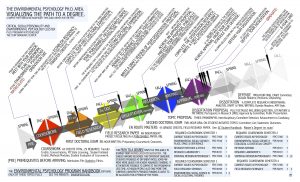A Critical Perspective on Human-Environment Relationships
Our work, broadly defined, addresses the relationships between people and place. This includes the social, cultural, psychological and political issues involved in the production, use, design, and occupation of space, place, and nature.
Environmental Psychology is a research-based interdisciplinary doctoral program at The Graduate Center of the City University of New York. We are housed in the psychology program but our program has a broader perspective on the field of Environmental Psychology, which is also referred to as Environmental Social Science.
The field draws on work from a number of disciplines including anthropology, geography, sociology, psychology, history, political science, planning, architecture, urban studies, and design. Our research concerns are largely urban and generally involve field studies that take advantage of the many opportunities available in the New York City area. Our work focuses on the serious problems associated with the urban environment with a view towards affecting public policy.
Our faculty and students use various research methods to investigate their research interests and answer questions about their surrounding world. Public space, children’s environments, housing and homelessness, participatory design and evaluation, political participation, sustainable lifestyles and development are among the interests of our faculty and students.
Mission Statement
Our research and pedagogy have evolved in important and distinctive ways since the Environmental Psychology program was established. Bringing together the knowledge we were gaining about the intertwining of social and environmental problems we developed a wide repertoire of quantitative and qualitative methods and a distinctive commitment to participatory action research. Critical visual methods and mapping became core to our endeavors. We emphasize critical and contextually grounded theory at both the psychological and social level.
Similar developments in critical social/personality psychology have recently led us to find ways to collaborate deeply as we move into a greater sharing of courses, colloquia, and other programmatic activities. At the same time, we also share commitments to fully embracing the spatiality and materiality of social and psychological life with the program in human geography at the Graduate Center. Our work extends beyond the walls of academia. We work in partnership with community based, national and international organizations concerned with the developing a more just and socially and materially sustainable world. Together we form a vibrant community of social inquiry aimed at furthering useful knowledge, an inclusive democratic society, and a more sustainable environment.

